 About GamePeople
About GamePeople
Subscribe to the Story Gamer column:![]() RSS or
RSS or
![]() Newsletter.
Newsletter.
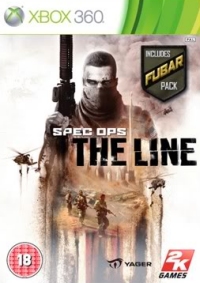
Format:
360
Genre:
Shooting
Style:
Thirdperson
Singleplayer
Buy/Support:
Support Mark, click to buy via us...
Other GamePeople columnists have reviewed this from their perspective - huh?:
Family Gamer (360)
Reporting Gamer (360)
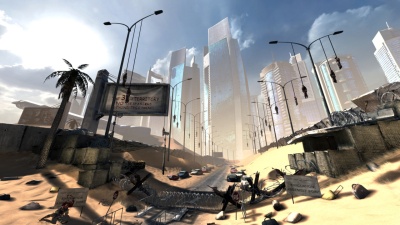
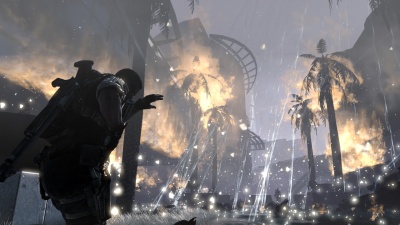
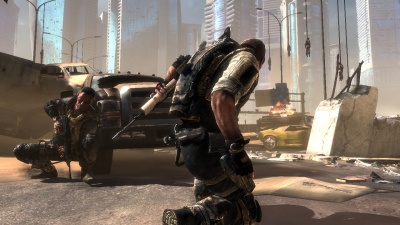
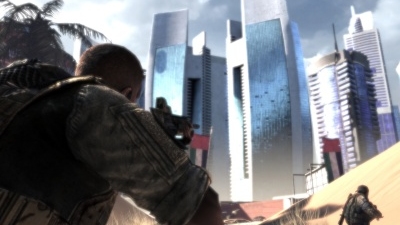

Further reading, films and books that create similar stories:
Spec Ops: The Line 360 has a wildly implausible premise, but uses it as the basis for a thoughtful, almost allegorical story that's a cut above the patriotic bluster of most contemporary shooters.
From the basic premise, which is only slightly more plausible than that of, say, Spyro the Dragon, it's hard to see what's so clever about Spec Ops: The Line.
However, look beyond the contrivances by which the game sets up its scenario, and you'll find a game that's not afraid of moral complexity, thoughtfulness and ambiguity, qualities that are disappointingly rare in videogames and almost non-existent in the sub-genre that perhaps needs them the most, the contemporary, 'realistic' military shooter.
The basic premise of the game may be unbelievable, but it's certainly engaging: a massive sandstorm has hit the city of Dubai, isolating it from the rest of the world. A US army batallion returning from Afghanistan disobeyed orders and went into the storm to aid the relief effort, only to disappear without trace until six months later, when a looped radio message from Colonel John Konrad pierced the storm wall.
This being a videogame, the US military authorities immediately send in a three-man team to locate Konrad, find out what has happened and call back for extraction.
This back story raises a ton of questions. What kind of storm works like that, forming a magic barrier around an entire city that persists for months while allowing some form of activity to go on within? What kind of use would a US army batallion be in such a situation? Does no-one have any satellites to see what's going on in Dubai? If Dubai is so isolated, how can three Delta Force dudes just walk in? Why that specific number of guys, rather than a larger force with actual medical support and resources? And how is a disaster in the United Arab Emirates a matter for the US military to deal with anyway?
All fair questions, but it's probably best to swallow the premise whole and forget about them. As becomes rapidly clear, Spec Ops The Line isn't trying to posit some plausible military scenario: rather, the storm and its fallout are a conceit that allows developer Yager to create a distinct and fascinating environment, a chunk of the civilised 21st century world cut adrift and brought low by nature.
In many ways this broken Dubai is the star of the game. Dubai is fairly notorious as an opulent playground for the rich and taste-deficient, a gaudy, excessive place where oil money has allowed an ultra modern skyline to be built in record time, largely by lowly paid migrant building workers. I've never been there, but it is by many accounts a strange, contradictory place, at least to western eyes - and that's another thread of Spec Ops' story, the westerner cast adrift in an exotic, brutal wilderness.
Spec Ops constantly questions the justifications for violent action.
The most famous of those stories is of course Joseph Conrad's Heart of Darkness, loosely adapted by Francis Ford Coppola into the Vietnam war-set movie Apocalypse Now. Spec Ops freely and openly takes from both (Colonel Konrad, anyone?), using that unlikely sandstorm to turn an ultramodern city into an urbanised version of Conrad or Coppola's jungle wilderness.
Devastated Dubai is a spectacular world where skyscrapers are half-buried in desert sands and half a year cut off from any outside influence has resulted in a cityscape strewn with bodies, rubble and ad hoc modifications: with the bases of many buildings buried, military zip lines traverse the skyline, and surreally luxurious environments are scarred by previous conflicts.
It's a wonderfully strange environment for a game, one that feels plausible, even familiar, while also being disconcertingly alien.
Martin Walker and his Delta buddies may be journeying through a threateningly alien, foreign environment, but interestingly Spec Ops isn't terribly interested in the alienness of foreign people. While the first enemies Walker and his team encounter are locals branded by Konrad's batallion as 'insurgents', their culture, their otherness, isn't an issue.
While Spec Ops could certainly be described as patronising towards anyone who isn't American - the locals are little more than passive actors in a story driven by Walker, Konrad's batallion and a couple of CIA spooks in the mix - it doesn't fall into the trap of playing with uncomfortable stereotypes of the mysterious, savage other that Resident Evil 5 keeled head-first into.
Instead, the locals are portrayed sympathetically even when they represent a threat, their violent reactions a comprehensible if misguided response to a terrible situation exacerbated by the interference of the various American factions in the city. Most of the time they're innocent victims, not just of the players enemies, but of the consequences of Walker's intervention.
This gets to the heart of the matter - if most military shooters endeavour to create situations where the ends justify whatever violent means the player might find entertaining, Spec Ops does the opposite, constantly questioning the justifications for violent action. There's no ticking terrorist time bomb or relentless Nazi war machine to excuse the body count Walker notches up - instead, the player is repeatedly put into situations where to fight on will cause the situation to get worse.
Spec Ops: The Line is pleasingly free of redemptive moments.
But fight on I did, because the only other choice was to put the game away and stop playing, just as for Walker and his men the only alternative to atrocity is to lay down their weapons and die, an option that they're not willing to countenance. In this game, even the urge to survive doesn't excuse some of the characters' actions.
Spec Ops: The Line is pleasingly free of redemptive moments, and of binary choices which allow the player to pick a 'good' way of waging war. There are choices offered within the game, some of which can have brief, positive outcomes of a sort, but none truly stop a bad situation getting worse.
In this respect it's a remarkably clear eyed game when it comes to the limits of military intervention. Konrad goes into Dubai on humanitarian grounds, but arguably makes the situation worse. Spec Ops dares to say that, regardless of good intentions and the personal heroism of individual soldiers, war is often a bad tool for saving people rather than killing them.
Spec Ops: The Line isn't perfect, far from it. It's full of artificial videogame constraints, like Walker being unable to walk in certain directions because there's an overturned sunbed or other flimsy-looking obstacle in the way. It's a straightforward cover shooter at heart with randomly scattered barriers and regenerating health. Some of the action gets repetitive, especially during later stages when firefights get not so much chaotic as congested, with dozens of enemies filling the air with gunfire.
Most of all, and this will be the kicker for a lot of potential purchasers, Spec Ops: The Line has a short single-player campaign that can be knocked on the head over two or three evenings. Hardcore shooter fans or players with uninterrupted stretches of free time on their hands will probably get through it faster.
It's thoughtful, almost allegorical in places.
Nonetheless while it may be short, the campaign is very strong, well-structured with memorable environments, set pieces and character moments.
Days after completing it, I'm still thinking about some of the standout moments in the game: the first time Walker and his men encounter hostile US troops, and desperately try to talk their way out of the situation to avoid shooting their brothers in arms; the way that shooting out certain windows can allow trapped sand to flood into an environment, burying enemies beneath the dunes; approaching the world's tallest building until you can't even pull the stick back far enough to see the top; the line that Walker crosses mid-way through the game, and its horrific consequences.
Spec Ops: The Line gave me a lot to think about. It's thoughtful, almost allegorical in places, and while it still offers the thrills that a shooter needs to it contextualises the action in a way that sets it well apart from the empty, patriotic bombast of most other contemporary shooters. Playing it was far from a comfortable experience, but an experience well worth having.



Mark Clapham writes the Story Gamer column.
"I love a good story. Games tell many different stories: the stories told through cut scenes and dialogue, but also the stories that emerge through gameplay, the stories players make for themselves."
Here are the games I've been playing recently:
© GamePeople 2006-13 | Contact | Huh?

|
Family Video Game Age Ratings | Home | About | Radio shows | Columnists | Competitions | Contact
With so many different perspectives it can be hard to know where to start - a little like walking into a crowded pub. Sorry about that. But so far we've not found a way to streamline our review output - there's basically too much of it. So, rather than dilute things for newcomers we have decided to live with the hubbub while helping new readers find the columnists they will enjoy. |
Our columnists each focus on a particular perspective and fall into one of the following types of gamers:
|